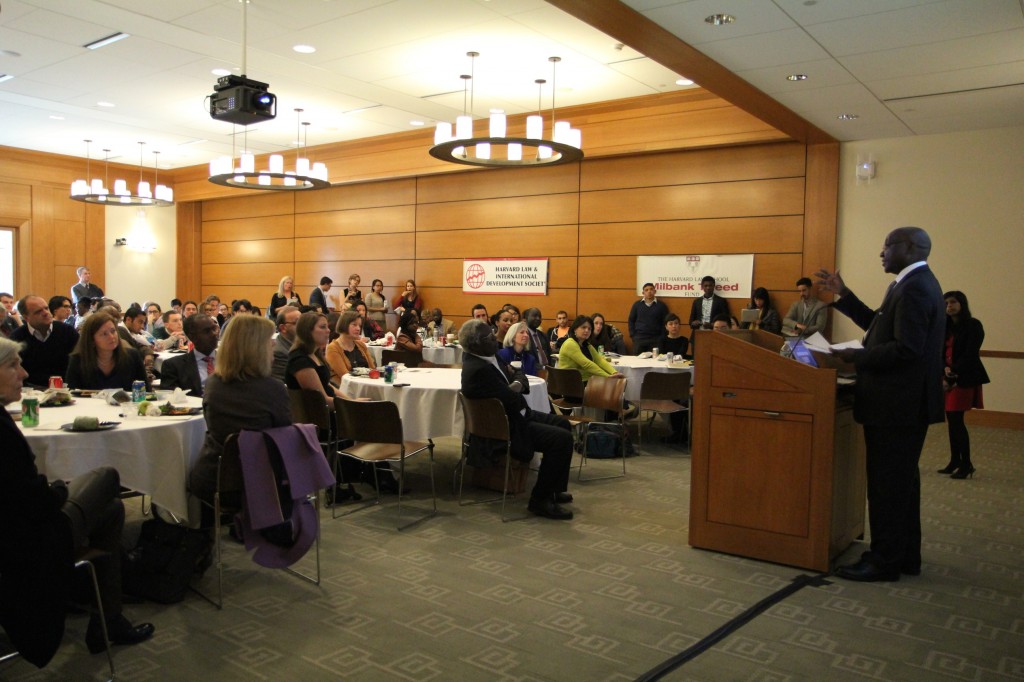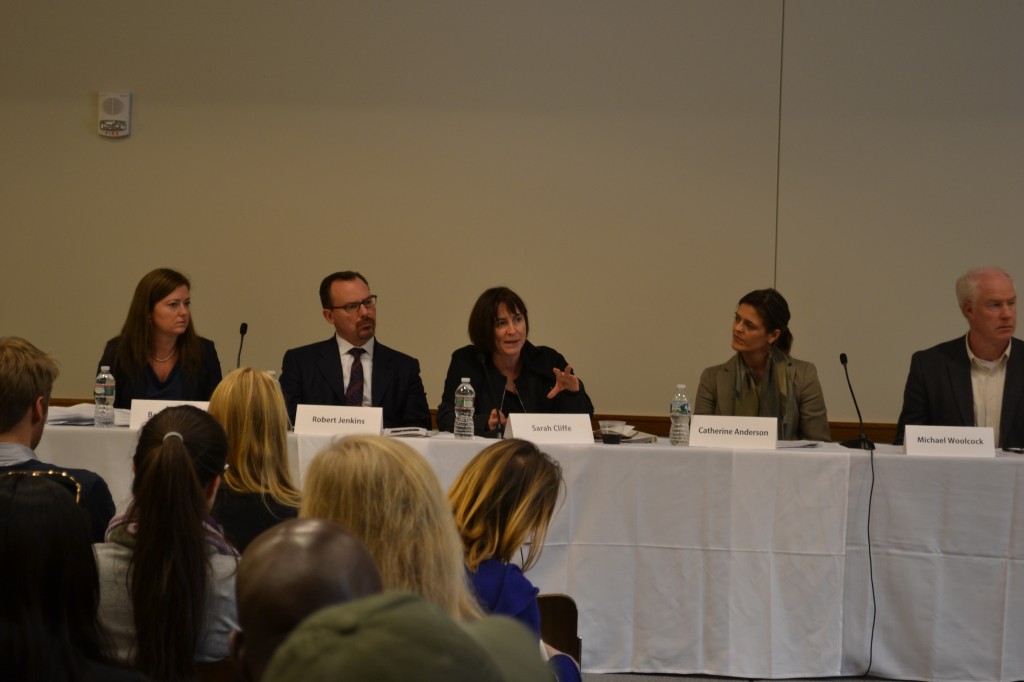On Friday, October 31, 2014, experts, scholars, and practitioners in the field of post-conflict reconstruction convened at Harvard Law School for our annual symposium. This year, the Symposium’s theme was Post-Conflict Reconstruction: Rebuilding from Emergency to Development, and focused on strategies to best promote growth, stability, and long-term development in countries arising from violent conflict. Speakers and panelists discussed issues facing countries that having arisen from conflict such as Rwanda, to countries that are very much still in the process of transition, like Syria.
The event started with an illuminating talk by Keynote Speaker Dr. Donald Kaberuka, President of the African Development Bank, and former Minister of Finance and Economic Planning in Rwanda. Dr. Kaberuka spoke in depth about strategies to promote growth and development in fragile and post-conflict states. To begin with an example, he spoke about how a brutal civil war destroyed much of infrastructure, including health systems, education systems and infrastructure, in Guinea, leading to the country’s inability to effectively control the Ebola epidemic today (coupled with a poor international response). Dr. Kaberuka further went on to emphasize how conflict can happen anywhere, and is not limited to Africa — despite certain stereotypes. Dr. Kaberuka spoke about the Bank’s work in this area, particularly in: rebuilding economies; rebuilding capacities; and helping post-conflict countries reengage with the international community. In particular, he emphasized that each conflict and each country can be drastically different, so there are no one-sized solutions; it depends very much on the state and who controls it.
In addition, he noted a few factors for success: first, a strong sense of ownership and responsibility; second, be pragmatic, but understand that making mistakes is normal; third, turn weaknesses into opportunity; and fourth, engage the private sector and leverage it to rebuild the economy. It is important to take bold steps early on, including abolishing controls, liberalizing, and ensuring independence of the central bank, and yet to redistribute wealth by investing in health and education. Ultimately, it is up to each nation to engage in rebuilding the country and resolving their problems. As he stated, “Rebuilding a nation cannot be outsourced. Only the nationals can rebuild their country.”
Click here to download a video of Dr. Kaberuka’s talk.
Following Dr. Kaberuka’s talk, we moved on to the first panel, titled Driving Economic Growth and Building Institutions After Conflict. The panel featured practitioners, academics and policymakers who work in government institutions and non-profits to promote growth and institution building in post-conflict countries. Panelists included: Catherine Anderson, Justice and Conflict Advisor, World Bank Justice Reform Practice Group; Sarah Cliffe, Special Adviser for East Asia and Pacific Region, World Bank; Robert Jenkins, Deputy Assistant Administrator, USAID Bureau for Democracy, Conflict, and Humanitarian Assistance (DCHA) and Executive Director, USAID Task Force on Syria; and Barbara Smith, Senior Director for Governance and Law, Asia Foundation. The panel was moderated by Michael Woolcock, Lead Social Development Specialist, World Bank Development Research Group and Lecturer in Public Policy, Harvard University’s Kennedy School of Government (and a founder of the World Bank’s Justice for the Poor program).
The panelists spoke not only about post-conflict development but about how prevention is equally important; countries with weaker institutions are at 50% higher risk of conflict. Robert Jenkins in particular spoke about the importance of countering violent extremism, and the need to address the rising youth bulge and their demands for jobs and dignity. He emphasized how post-conflict development is in itself conflict prevention, and that it is a lot cheaper to prevent a war than to be in war. There were also discussions about aid coordination and how to improve the response of the international community, including donors and major institutions.
Click here to download a video of the first panel
Finally, our second panel was titled Developing Stability and Security: Post-Conflict Security Sector and Justice Reform, and focused largely on the rule of law aspects of post-conflict rebuilding. Panelists were: Angela Conway, Director of the Middle East & North Africa (MENA) Division, American Bar Association Rule of Law Initiative; Jean-Marie Kamatali, Assistant Professor of Law, Ohio Northern University College of Law; and Vivek Maru, Founder and CEO, Namati. The panel was moderated by David Marshall, Senior Rule of Law Advisor, New York Office, UN High Commissioner for Human Rights.
This panel provided a fascinating look into justice systems in countries arising from conflict, with case studies from Sierra Leone, South Sudan, and Rwanda, among other places. The group had a discussion about what ‘rule of law’ actually means, and why it is important in post-conflict nations. Vivek Maru particularly emphasized the importance of the model used by Timap for Justice and other grassroots organizations in countries arising from conflict, where the formal justice system often lacks capacity; this model utilizes grassroots, community paralegals to provide justice to ordinary people quickly on issues such as criminal justice, land disputes, and citizenship. He emphasized how important it is to support and expand such projects to ensure justice in countries such as Sierra Leone, and how such a method promotes the rule of law. David Marshall spoke about his work with the UN in South Sudan, and how there can be such a disconnect between ‘rule of law’ and ‘human rights’ practitioners within the UN and other institutions. Angela Conway spoke about the ABA Rule of Law initiative’s programs around the world and in Libya, Iraq, Egypt, and the Gulf. Finally, Jean-Marie Kamatali discussed his personal and professional experiences with the Rwandan genocide, and how it can be incredibly difficult to rebuild trust in such an environment, and how transitional justice and accountability processes can promote rebuilding the rule of law.
Click here to download a video of the second panel.
Contact Symposium Chair, Akhila Kolisetty (akolisetty [at] jd15.law.harvard.edu) for more information!






